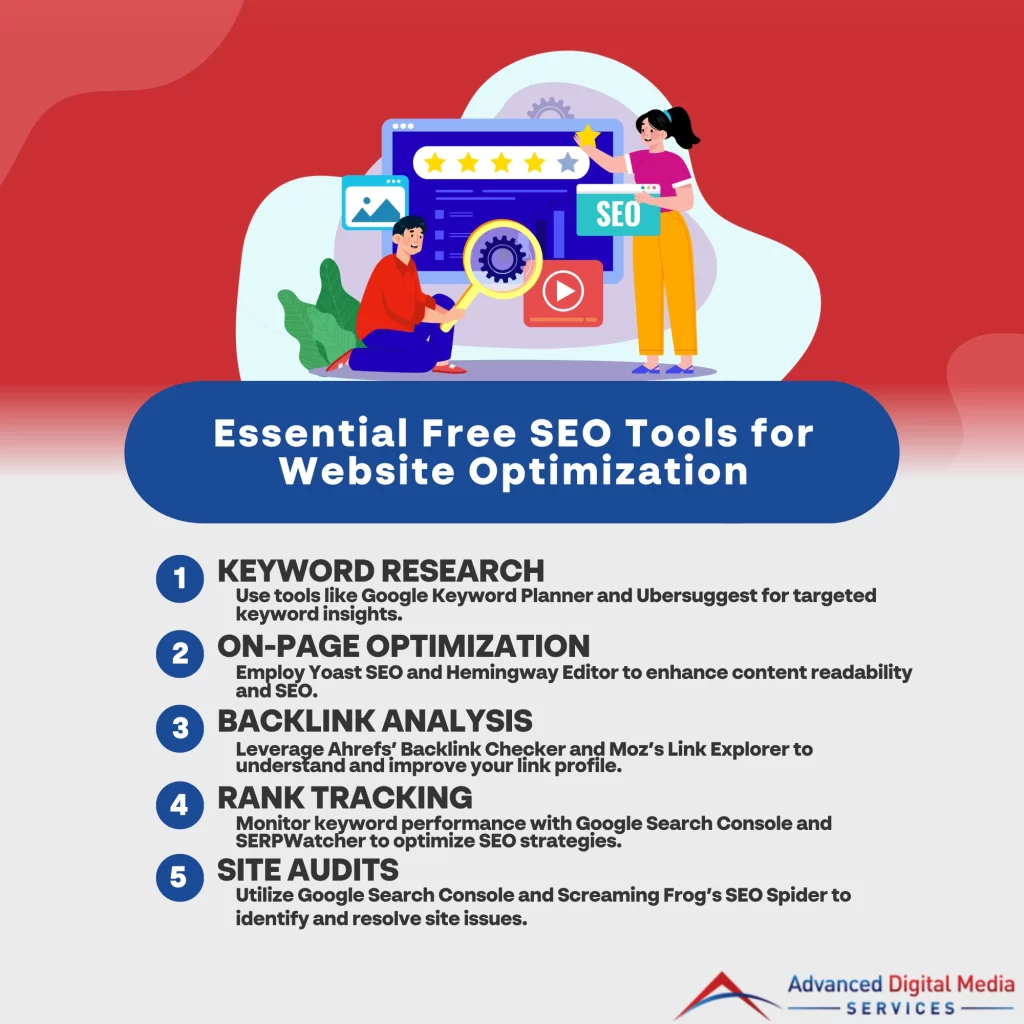When searching for the best free DIY SEO tools, you’ll find crucial resources like Google’s Keyword Planner, Ubersuggest, and AnswerThePublic for robust keyword research. For on-page SEO, tools like Yoast SEO and Hemingway Editor help optimize your content. Backlink insights from Ahrefs’ Backlink Checker and Moz’s Link Explorer are invaluable. Track your rankings with Google Search Console and SERPWatcher. Conduct site audits using Google’s Search Console and Screaming Frog’s SEO Spider. Leveraging these tools will greatly improve your website’s performance. To gain deeper insights into maximizing your SEO efforts, there is much more to explore.

Key Takeaways
- Google Keyword Planner: Provides search volume and competition data for keyword research.
- Ubersuggest: Offers keyword suggestions, backlink insights, rank tracking, and competitor analysis.
- Google Search Console: Highlights site performance issues, keyword ranking data, and technical SEO insights.
- Ahrefs’ Backlink Checker: Shows top backlinks and domain rating metrics for backlink analysis.
- Yoast SEO: Provides real-time feedback on readability and keyword optimization for content improvement.
Keyword Research Tools
When optimizing your website, you’ll frequently find that selecting the right keyword research tools is crucial for driving targeted traffic and boosting search engine rankings. Understanding how to do SEO yourself starts with grasping the importance of effective keyword research. By identifying high-volume, low-competition keywords, you can strategically position your content to attract and convert visitors.
For do-it-yourself SEO, several free keyword research tools can provide valuable insights. Google’s Keyword Planner is a widely-used tool that offers data on search volume and competition for specific terms. Another robust option is Ubersuggest, which provides keyword suggestions, search volume, and competitive metrics. It even includes historical data to help you understand trends over time.
AnswerThePublic is another excellent tool that visualizes questions people are asking around your keywords, giving you content ideas that match user intent. Additionally, tools like KeywordTool.io can generate long-tail keyword suggestions from various search engines.
Using these keyword research tools effectively involves analyzing the data to identify keywords that align with your business goals. By focusing on terms that have significant search volume but lower competition, you can improve your site’s visibility and drive more relevant traffic, ultimately boosting your search engine rankings.
On-Page SEO Analyzers
After identifying the right keywords, leveraging on-page SEO analyzers can help guarantee your content is refined for search engines, enhancing its relevance and readability. These tools are indispensable for anyone looking to master how to do SEO on your own, providing actionable insights and data-driven recommendations.
By utilizing these free on-page SEO tools, you can:
- Improve Content Quality: Confirm your content meets the standards of search engines and readers.
- Boost Keyword Placement: Get suggestions for peak keyword usage and density.
- Analyze Meta Tags: Evaluate your meta descriptions and title tags for better click-through rates.
- Enhance Readability: Check for readability scores and suggestions to make your content more engaging.
- Monitor Internal Links: Identify opportunities to add internal links and improve site structure.
For do it yourself SEO enthusiasts, these tools are a goldmine. They provide you with the metrics needed to fine-tune your content, making certain it aligns with search engine algorithms. Understanding search engine optimization do it yourself techniques is essential for sustained online success, and on-page SEO analyzers are a fundamental part of that toolkit.
Backlink Checkers
To elevate your site’s authority and search engine ranking, leveraging free backlink checkers is critical for analyzing and improving your backlink profile. Backlinks, or inbound links, are fundamental as they signal to search engines that your content is credible and valuable. If you’re focused on how to do SEO yourself, understanding and optimizing your backlink profile is significant.
One of the top free tools is Ahrefs’ Backlink Checker, offering a snapshot of your top 100 backlinks and top 5 anchors. It provides important metrics like Domain Rating (DR) and URL Rating (UR), helping you emphasize high-quality link acquisition. Another excellent option is Moz’s Link Explorer, which gives you access to the top 50 linking domains, anchor text details, and spam score analysis.
For those who prefer a more detailed breakdown, Ubersuggest by Neil Patel offers a robust backlink analysis, showing new and lost backlinks over time. This tool is particularly useful for do it yourself SEO, as it provides actionable insights to improve your link-building strategy.
Rank Tracking Tools
Tracking your keyword rankings is essential for measuring the effectiveness of your SEO efforts and making data-driven adjustments to improve your site’s visibility. When you’re diving into search engine optimization do it yourself, having reliable rank tracking tools is non-negotiable. These tools help you monitor where your site stands for specific keywords, enabling you to tweak your strategy and boost your rankings.
Here are some top free rank tracking tools that can help you master how to do SEO on your own:
- Google Search Console: Provides keyword ranking data directly from Google, offering insights into search performance and user queries.
- Ubersuggest: Allows you to track your rankings and get suggestions for new keywords, making it a go-to for do it yourself SEO.
- SERPWatcher by Mangools: Offers a user-friendly interface and detailed reports to help you stay on top of your keyword performance.
- SERP Robot: Simple yet effective, it lets you track up to 10 keywords for free.
- AccuRanker: Known for its speed and accuracy, this tool provides daily updates on your keyword positions.
Using these tools, you can make informed decisions, optimize your content, and ultimately improve your search engine rankings.
Site Audit Tools
When optimizing your website for search engines, site audit tools are indispensable for identifying technical issues that could hinder your site’s performance. These tools help you uncover problems like broken links, slow loading times, and missing meta tags, which can severely impact your SEO efforts.
To effectively do it yourself SEO, you need reliable site audit tools. One of the best free options available is Google Search Console. It provides key insights into how your site is performing on Google Search and highlights vital issues that need fixing. Another excellent choice is Screaming Frog’s SEO Spider. Although the free version has limitations, it allows you to crawl up to 500 URLs, making it a solid choice for smaller websites.
Understanding how to do SEO yourself involves leveraging these tools to scan your site for errors and optimization opportunities. For example, you can identify and resolve 404 errors, optimize images for faster loading times, and confirm your site is mobile-friendly—all essential for search engine optimization do it yourself.
Content Optimization Tools
For effective SEO, content optimization tools are crucial for improving the quality and relevance of your website’s content based on data-driven insights. If you’re looking to do it yourself SEO, these tools provide you the necessary means to refine your content strategy and achieve better search engine rankings.
Understanding how to do SEO on your own involves leveraging these tools to analyze keywords, readability, and overall content performance. Here are some of the best free content optimization tools to take into account:
- Yoast SEO: This plugin helps you optimize on-page SEO by providing real-time feedback on readability and keyword usage.
- Google Keyword Planner: An invaluable resource for keyword research, helping you identify high-traffic keywords to target.
- Hemingway Editor: Improves readability by highlighting complex sentences and offering suggestions for simpler alternatives.
- AnswerThePublic: Generates content ideas by displaying the questions people are asking around your target keywords.
- Ubersuggest: Offers keyword suggestions and content ideas, along with insights into what competitors are doing.
These tools are indispensable for anyone aiming to understand how to do SEO yourself. By integrating these into your content strategy, you can greatly boost your website’s visibility and engagement metrics.
Competitor Analysis Tools
Competitor analysis tools are essential for gaining insights into your competitors’ strategies, enabling you to refine your own SEO tactics based on actionable data. When you’re figuring out how to do SEO on your own, leveraging these tools can give you a competitive edge.
First up is Ubersuggest. This tool offers a thorough overview of your competitors’ top-ranking keywords, backlink profiles, and content strategies. By analyzing this data, you can identify gaps in your own strategy and adjust accordingly.
Another invaluable tool is SpyFu. SpyFu allows you to see which keywords your competitors are bidding on for PPC campaigns and what organic keywords are driving their traffic. This information helps you to emphasize high-impact keywords in your own content.
Then there’s SEO Quake, a browser extension that gives you a wealth of information about any webpage you visit. Instantly view metrics like keyword density, internal and external links, and traffic data, allowing you to benchmark your site against competitors.
Conclusion
Just when you think you’ve opened up the full potential of free DIY SEO tools, there’s always another layer waiting to be discovered. From keyword research to competitor analysis, the right tools can transform your strategy. But remember, the ultimate secret weapon isn’t a tool—it’s how you use it. Are you ready to dive deeper, refine your tactics, and watch your site climb the ranks? The journey to SEO mastery has only just begun.






